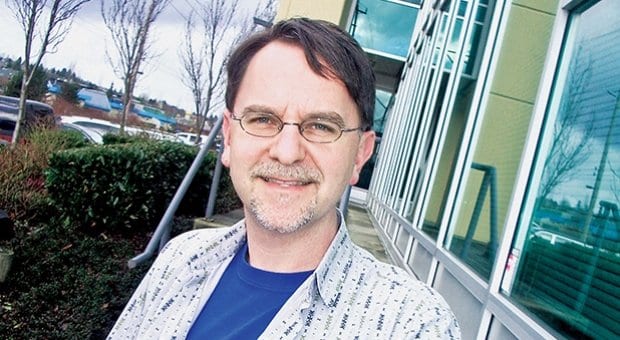BC teachers’ work-to-rule job action slowed implementation of Burnaby’s anti-homophobia policy, but education stakeholders say they’re happy with the progress made.
“We went on a job action in the fall of 2011, which negated meeting with the district and extracurricular activities and all of that, so we weren’t able to engage in that process for the year in a formal way,” Burnaby Teachers’ Association president James Sanyshyn says.
But even as the strike unfolded, Sanyshyn says, the district moved ahead with plans to implement Policy 5.45, including purchasing more learning resources and initiating a safe-spaces sticker program to provide contacts for queer students experiencing difficulties.
The Burnaby school board passed its anti-homophobia policy on June 14, 2011, despite opposition from hundreds of vocal parents, many of whom were Chinese attendees of nearby Willingdon Church, a large Protestant congregation. Many of the parents were upset about the policy’s perceived infringement on their right to teach their children that being gay is not acceptable.
School board trustee Gary Wong, who co-chairs the district’s LGBTQ committee, says it’s going to take some time to fully roll out the new anti-homophobia program.
“The process at times can feel slow because I think everybody is educating everybody else in the committee, and everyone brings their own perspectives and obviously their own biases,” says Sanyshyn, who sits on the committee. “But it’s really picked up in the last few months.”
Wong says the district is interested in hosting another You Can Play panel on gay athletes next year, this time during a school day so that more students attend. About 100 people, mostly adults, attended the March panel at the Michael J Fox Theatre.
The school board also plans to march in the Vancouver Pride parade, with students, teachers, staff and trustees encouraged to attend. Last year, trustees marched behind the Vancouver School Board’s banner.
A professional development day held in February devoted to Policy 5.45 focused on anti-homophobia education in elementary schools, gay-straight alliances (GSAs) in secondary schools, and a review of the province’s Making Spaces document on integrating anti-homophobia education into the whole curriculum.
Sanyshyn describes the turnout as “decent.” More workshops for principals are planned for this fall.
Sanyshyn and Wong note that all eight secondary schools in the district now have GSAs with teacher contacts.
“When we first started this initiative, I think we had about one and a half GSAs — the half was struggling and pretty limited,” Wong notes.
Teacher Debra Sutherland believes that both district administrators and trustees are committed to the policy, but funding remains a barrier to doing more systemic work.
“We need to mentor more people. There’re some teachers doing some very good work, but there’s many more that still don’t recognize that they can be doing it,” she says. “They just need support.”
Parent Shahraz Kassam, who has two kids in Burnaby schools, says some teachers are unaware of Policy 5.45.
Kassam says once the policy passed, things seemed to go into “silent mode.”
He would like to see more hands-on initiatives rolled out in schools, including enlisting guest speakers to address students and encouraging teachers to incorporate gay-related news into their current affairs classes. “In that way, at least, you’re changing the curriculum on a daily basis.”
Paraphrasing the Vancouver School Board’s diversity coordinator, Maria Foster, Sutherland says she feels it’s necessary to “bring the policy to the people.”
She says there is a plan to apply for more funding for training with all staff groups next year, not just administrators.
Still, she thinks the ideal is to have a dedicated anti-homophobia and diversity consultant position like the Vancouver School Board has.
“If you embed it in a staff person that’s specialized and has the skills and knowledge, the chances of more systemic change happening is more likely,” she says.
Asked if lack of funding limits the policy’s implementation, Wong admits that it’s a challenge, as the district had to cut its budget this year by $2 million.
“Certainly, we never seem to have the resources that we would want, but a lot of the stuff that we’re doing we have district staff doing,” he says.
“There was this initial concern about whether we have the funds for resources,” he agrees. “What we do is we provide information to the teacher librarians and to the teachers to review, and there’s a protocol that they follow to order [resources], and there’s a budget for that.”
Sutherland says at least half of the elementary schools have ordered some of the basic queer-focused resources.
Wong says he’s a lot happier now with the progress on policy implementation than he was at the start, but he says there’s still a lot of work to be done.
“Is it going to take some time? Yes. But overall, I think that I am fairly satisfied about where we’re at, at this point.”
Sutherland agrees that action on the policy was better this year than during the work-to-rule year. “But still, for those of us that are activists, it’s still a little frustrating.”


 Why you can trust Xtra
Why you can trust Xtra


